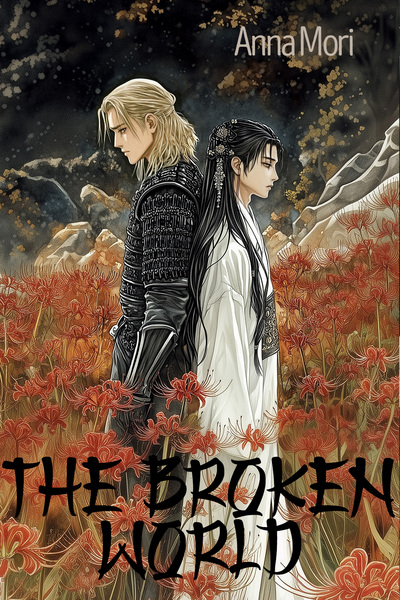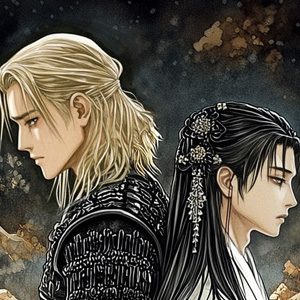The year of the Wood and the Snake, under the sign of Yin, was a year of sorrow for the kingdom of Ryukoku. What the people of Ryukoku had both feared and anticipated for years finally came to pass: Emperor Yoshihito, now nearing his eightieth year, departed this life, leaving his only grandson, a sixteen-year-old boy, as his successor. The young heir, Yukinari, was crowned with great pomp and ceremony, but no one placed much hope in the boy emperor. Yoshihito was remembered for his gentle disposition and courteous dealings with his subjects, but his reign had been devoid of any great achievements. As for his grandson, rumors whispered that he was unfit to rule.
Ryukoku was already in dire straits. The long, grueling war with Yuigui, the Kingdom of the Tortoise, had reduced it to near ruin. The conflict, which had dragged on for years, was less a war and more a prolonged subjugation punctuated by occasional uprisings.
Meanwhile, to the west, a new threat was rising: Cheongju, the Land of the Tiger, was rapidly gaining strength. It was not only prospering but devouring its neighbors piece by piece, like a ravenous predator. "The age of the White Tiger of the West has come," people muttered — a reference to the legend that each kingdom was under the protection of one of the Four Great Divine Beasts.
The success of Cheongju was widely attributed to a single man: a general whose name sent shivers down spines. His name was Gerel, and his origins were as strange as his reputation was fearsome. It was said he was one of the Strangers — the pale-skinned southerners of legend, with fair hair, narrow faces, and sharp noses. Some called them sorcerers, others immortals.
How else could one explain the rise of a man like Gerel? By twenty, he was the supreme strategist of Cheongju and the emperor’s closest advisor, not only in military matters but in statecraft as well.
The tales about him grew more lurid with every telling. He was said to be a creature of unearthly appearance — pale-haired and ghostly, with eyes as cold and colorless as ice. They said he was merciless, a monster who killed children before their parents’ eyes and forced fathers to defile their daughters. His victims, it was said, were strung up on posts or impaled, their bodies left as grim warnings to all who dared defy him.
Much of what was whispered about Gerel the Cruel was true, though he prided himself on rarely resorting to such measures without reason.
Yet in the Year of the Wood and the Snake, Gerel had little thought for distant Ryukoku or the changes stirring there. Two years earlier, he had launched a campaign against Yuigui. In hindsight, it had been overambitious, and he knew it. To outsiders, Cheongju's victories seemed decisive, but Gerel saw the truth: Yuigui was too wealthy, too vast. For every fortress or city he took, holding them strained his forces to the breaking point.
It was like a small predator harassing a beast many times its size — a struggle both futile and self-destructive.
Gerel realized that to truly defeat the Land of the Tortoise, Cheongju needed a decade to grow stronger. Its armies had to be rebuilt, its weapons refined, and its fleets expanded. Victory would come, he believed, but only if Cheongju bided its time. Yuigui’s strength, paradoxically, was also its weakness. Its dominance over the world had left it complacent, bloated with self-confidence.
Gerel had once debated this very point in his youth with his tutor Ling, a Yuigui scholar who had not yet realized he was educating a future enemy of his homeland.
“In Yuigui,” Gerel had said hotly, “even a soldier must be a poet and a scholar to advance in rank. Isn’t that absurd?”
“You love books yourself, Gerel,” Ling had countered with amusement. “You’ve often said that knowledge cuts sharper than any blade.”
“Yes, but poetry?” Gerel scoffed. “Surely that’s a sign of a kingdom in decline.”
To him, who had grown up under the harsh skies of the West, it seemed terribly absurd that a man should be judged not by his deeds, but by his ability to compose poetry and — gods! — by the beauty of his handwriting.
Ling had chuckled at the young man’s indignation. “If Yuigui is so foolishly governed, why does it control so much of the world?”
Gerel had no answer to that.
Even then, Ling had admitted that Gerel had a point. “A great kingdom, once it reaches its zenith, inevitably begins to decay. Yuigui is no exception,” he had said thoughtfully.
“Did you come up with this yourself?”
“That a state, having reached its peak, dies? Oh no. This is a very popular theory among our young intellectuals… But your land, Cheongju — it’s young, hungry, and fierce. Its time may yet come.”
Gerel had pondered those words for years. Ling was prone to exaggeration, of course — Yuigui was far from its deathbed. Only a nation that had ruled unchallenged for a century could afford such idle self-criticism. Residents of any other country didn’t have such luxury — on the contrary, everyone tried as best they could to extol the virtues of their own homeland. Still, there was truth in the old man’s theory.
Cheongju’s time would come.
The Land of the Tiger had long since outgrown its origins as a realm of nomadic tribes, like the southerners. Now, it was almost a real empire. The lands of the Tiger were considered to be among the most inhospitable. Its winters were harsh and snowbound; its summers, blisteringly hot and prone to droughts. But its people had endured and thrived. They built ships, castles, and irrigation canals. They established an administrative system, simpler than Yuigui’s but effective nonetheless.
Recently, they had even developed their own writing system — a source of great national pride, though most still clung to the Yuigui hieroglyphs, and literacy remained a rare skill.
As for the emperors of the two lands, neither was particularly remarkable. Yuigui’s current emperor was weak (and this was the country's second weakness). The emperor of Cheongju, Tokhung, to whom Gerel had sworn allegiance as a boy, was also hardly an outstanding ruler.
But Gerel did not fight for Tokhung. He fought for Cheongju’s future.
When the Land of the Tiger finally gained the strength to crush Yuigui, the people of the Land of the Tortoise would be more willing to accept not a Western barbarian, but an educated ruler who spoke their language and understood their ways.
And that, Gerel believed, could only be him.
The years that followed were far from easy. As Gerel had foreseen, the Kingdom of the Tiger grew immensely powerful. Yet the nomads of the southern steppes remained defiant, forcing him to redirect his forces time and again to subdue their rebellions.
Gerel wielded not only the sword but also mercy when it suited his purposes. He promised — and kept his promise — that any nomads willing to settle on the land and live under Cheongju’s rule would be spared. But most refused to bow to him, continuing their raids and lawless ways. The nomads were a constant, vexing thorn in Cheongju’s side. For centuries, the kingdom had clashed with these wandering tribes, yet no king or general had managed to fully eradicate the threat.
The nomads had no cities, no countries, no centralized authority — only scattered uluses, clans and tribes that roamed endlessly. Defeat one, and another would emerge from the endless expanse of the steppes. With great difficulty, Gerel began to establish fortified cities and strongholds along the coast of the Inner Sea. Yet the nomads repeatedly descended upon these settlements like wolves upon sheep.
Still, those cities that survived became the foundation for Cheongju’s expansion. Slowly but steadily, the Tiger extended its claw eastward along the sea, toward Ryukoku — the Land of the Dragon.
For a time, Gerel gave Ryukoku little thought. To him, it was merely a potential trading partner, a weakened kingdom that posed no immediate threat.
But the balance of power in the Middle Kingdoms was beginning to shift.
When the young ruler Yukinari ascended the throne of Ryukoku, he adopted a surprisingly modest regnal motto: “The Pursuit of Order.” It was a far cry from the grandiose slogans of his predecessors, who had proclaimed lofty goals of prosperity, wealth, or even heavenly bliss — and had achieved none of them.
At first, neighboring states watched with bemused curiosity as the boy-emperor struggled to shoulder the immense burdens of state. But gradually, they began to notice something remarkable: under Yukinari’s rule, Ryukoku was beginning to recover.
His quiet but unyielding authority began to reform even the most corrupt and self-serving officials. Agricultural and economic reforms bore fruit, and successful trade and political alliances were forged with northern cities and southern tribes. For the first time in years, the people of Ryukoku dared to hope.
Within a few years, the Land of the Dragon had transformed into a strong and, by the standards of the time, prosperous kingdom. It soon became clear that Yukinari had a bold vision: to reconcile with Yuigui and unite the Middle Kingdoms against a new common enemy — the West.
His efforts seemed destined for success. The boy-emperor had grown into a wise and charismatic ruler, whose magnetism drew allies to his side with remarkable ease.
Of course, Yukinari’s rise did not go unnoticed by his rivals. Emperor Tokhung of Cheongju, emboldened by his victories over the southern nomads, began to dream of expanding his empire further east. Beyond the mountains lay Ryukoku, a land shrouded in mystery.
Little was known about the Land of the Dragon, and Tokhung’s advisors debated whether a campaign against it would yield any true rewards. Yet what stung Tokhung most was the growing prominence of Ryukoku’s name. Across the Middle Kingdoms, the Land of the Dragon and its young emperor were becoming topics of frequent conversation — and praise.
For Tokhung, this was an affront that could not be ignored.











Comments (0)
See all